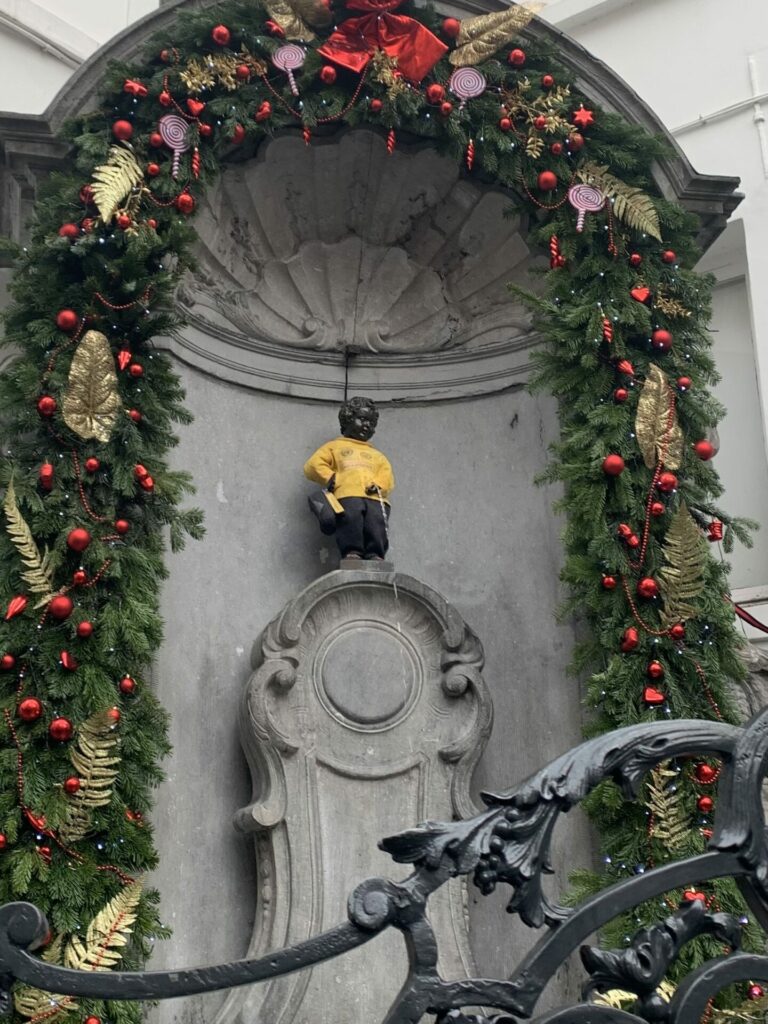It’s Manneken Pis overload as you weave your way through the cobbled crowded streets of the Grande Place to visit the little guy. The Belgian mascot, a bronze statue of a little boy peeing into a fountain, is replicated in chocolate, plastic, emblazoned across t-shirts, scarves, pants, bras, probably condoms, who knows. The souvenirs you can take home in garish colours are often 3 or 4 times the size of the real thing. By the time you arrive at the diminutive statue, all of 50cm tall, it’s underwhelming.
Having grown up in Brussels, I was keen to take my family on a pre Christmas visit last December to indulge in nostalgia and chocolate. We boarded the Eurostar from St Pancras early on a Sunday morning and in the blink of an eye, we had arrived at Gare de Midi. I wanted my two teenage boys to fall in love with Brussels like I had. I thought a trip to see the iconic statue was the best starting point.
What took me by surprise was that on the day of our visit, Sunday 18 December 2022, Manneken Pis was dressed in a yellow coat with the words “I am a migrant” printed across it. This costume was designed for him to mark International Day of Migrants and was made from different recycled materials to symbolise the many migratory routes and multilayered ties between cultures.
I felt unexpectedly emotional at this. It took me back to when I first saw Manneken Pis. It was 1984 and me and my family had run away from war torn Lebanon. My father was working for an American company in Brussels at the time, 3M, so my mum, sister and me came to stay with him just until the war settled down and it was safe to return home. Months turned into years and I never went back. I was then, and still am, a migrant too.
By a stroke of luck, I was offered a space at the European School in Uccle, in the English section. The school is primarily for children of EU staff, second priority was for other EU nationals and third, my category, was for everyone else.
I was 12 years old and started noticing how much I differed from everyone else. I mainly noticed this because it was pointed out to me. First was my accent, a mix of Arabic sounding phonics with an American lilt. That was easy to fix. Within a few months, thanks to careful study of British tv via the BBC channels, I started sounding more like my peers. Becoming more like everyone else became my main mission. But there were some obstacles which were not easy to overcome.
Physically, I stood out. A mop of unruly jet black impossibly curly hair on top of my head. A prominent nose. Hair on my arms. Features that were mainstream in the Middle East but not in the West. Day in, day out at school I was teased about how I looked. I tried straightening my hair, bleaching, then waxing the hair on my arms, plucking my eyebrows so that they looked discreet and refined like those of my friends. Anything to make me feel less like an ugly duckling.
I was in awe every time I went to a friend’s house. They all seemed to live in large homes with a garden. Other than my uncle in the mountains above Beirut, I didn’t know anyone who had their own garden. Home for me was a modest 3 bedroom apartment in a high rise in Auderghem. When the landlady wanted to sell this apartment she gave my father a first right of refusal. She offered it at 3 million Belgian Francs, the equivalent of just under 75,000 euros. A giveaway price now but still a bargain back in 1988. My father quickly turned it down. Financially, it would have been impossible given that he wouldn’t entertain taking out a loan. Mortgages were an unknown concept to us. “Neither a borrower nor a lender be” was one of his favourite sayings. Being Lebanese he also felt that you don’t buy a place unless you think you will live in it forever. We were still on standby to go back to Lebanon. Just as soon as the war was over.
So we started hunting for another appartment to live in. This was a fun after school activity for a while. We would drive around various neighbourhoods looking out for “A Louer” signs. My sister and I sat in the back of the car and were tasked with shouting out every time we spotted the orange neon and black sign at which point my father would quickly pull over and go down and see if the property specs were suitable.
On one such occasion, all 4 of us had gathered around the buzzer waiting to view a place. A lady picked up and through the speaker shouted out at us “Pas des arabes ice!” before hanging up. My father, a proud man, turned to us and quietly said “get back in the car”. He was silent on the drive home and from then on took up househunting on his own.
Another noticeable difference between my friends and me was the way my family ate. At a friend’s we would sit down to dinner and a plate would be served to each of us with food already on it. Or there would be one dish on the table with a salad and second helpings optional. Dinner would take 5 minutes.
At our house, dinner would stretch on. Our dinner table tended to be filled with a variety of Lebanese dishes. Most of these (including hummus in those days) were unfamiliar to my friends so my mother would painstakingly introduce each one. She would pile food onto my friend’s plate whether they asked for it or not. We ate mezze with our hands. Maybe some of my friends enjoyed the gastronomic adventure and being taught how to scoop up food into Arabic bread. But for me, it was torture. I was embarrassed and hated having one more thing about me that was so different.
On weekends, I sought refuge in art galleries and museums. I found a sense of peace and calm there that I didn’t get at home or school. It was my art teacher, Mr. McGeary who opened my eyes to this entirely new world which I could escape to. He encouraged me to go and explore, suggested where to go. Through art, I realised that life is full of misfits, that a sense of not belonging is common. It was about finding the right channel to express yourself and also finding kindred spirits.
Luckily at the European School, I found a few. We were all migrants living in a country we were not born in. I was not the only one picked on. A few years into secondary school, a new student joined our class. She was from Sheffield with a strong northern accent which stood out against the predominantly BBC accents of the class. The bullies seamlessly shifted from picking on the small Lebanese girl to the stout ginger girl with a Yorkshire accent who shortened her vowels.
During the summer holidays we would often visit Beirut to check on our house, our family and friends. With each trip, as we were plunged back into the war with bursts of gunfire and the shrill whistle of a falling bomb, I felt more distanced from Lebanon. I could not wait to be back in the safety of Brussels. I wanted a life free from worry over scarcity of water and electricity or random explosions.
I was also discovering that Brussels was a treasure chest of adventure. In 1988, Kinepolis opened with an incredible 25 cinema screens to choose from. They put on a “nuit de cinema” where they screened 3 films back to back from 10pm. I pleaded with my parents and on receipt of the green light, I gathered a few friends and off we went. We were 14 years old and spent a whole night out watching movies and eating burgers from Quick.
Rock concerts at the Ancienne Belgique and Foret National became another favourite pastime and one which I would spend many hours babysitting in order to save up for. In summer, there was Torhout Werchter where we could see all our best loved bands in one day; R.E.M., INXS, Duran Duran.
This quest for adventure, thirst for new experiences culminated in that fateful day when, inspired by Ferris Bueller’s Day Off, I decided that we would have our own version which I plotted together with my Irish friend William. William and I recruited Lizzy into our scheme, a fatal error as it turned out. We were going to bunk off school and go to Walibi instead.
Even as I write this, with two teenagers of my own, I can’t believe we had the nerve to do this. On the eve of the Day Off, I packed my school bag. I left out my big books and added extra snacks (the money we saved up was going to be eaten up by the train and admission tickets). I left home nonchalantly in the morning and went to the usual bus stop. But then, I hopped off a few stops later and caught the Metro to Gare de Midi where I met up with William and Lizzy at the appointed hour and off we went. We didn’t have mobile phones so plans were made ahead of time with thought and care. No phones meant that our parents could not track us.
We had an incredible time at Walibi. All made that much more thrilling by the illicit nature of our adventure. At the normal school end of day time, we headed home feeling like the best Ferris Buellers ever. It wasn’t until that evening, when our phone rang and it was Lizzy’s mum who wanted to speak to my mum that we realised we had not got away with it. Lizzy’s mum worked at the school. During break time when she was having coffee with one of our teachers, she was asked if Lizzy was ok, hoping she was not too unwell? Odd that her two best friends, Angela and William were also off sick.
I can’t imagine what my parents thought about this blatant act of truancy but I can’t honestly say I regret doing it. It was crazy but we made the most enduring happy memories. Memories that tie me to those friends and to Brussels, the enabler, forever.
With my European Baccalaureate in hand, I followed many of my friends to university in the U.K. I studied Law at Cardiff University and then pursued my legal career in London. London has been my home now for most of my life.
But, Brussels. Well Brussels was like a big sister. It held my hand and helped me make the transition from East to West. It became part of me and is part of who I have become. After all these years, seeing Manneken Pis dressed up as a migrant on the exact day that I went to visit him, felt like a hug from my beloved, beautiful Brussels.


